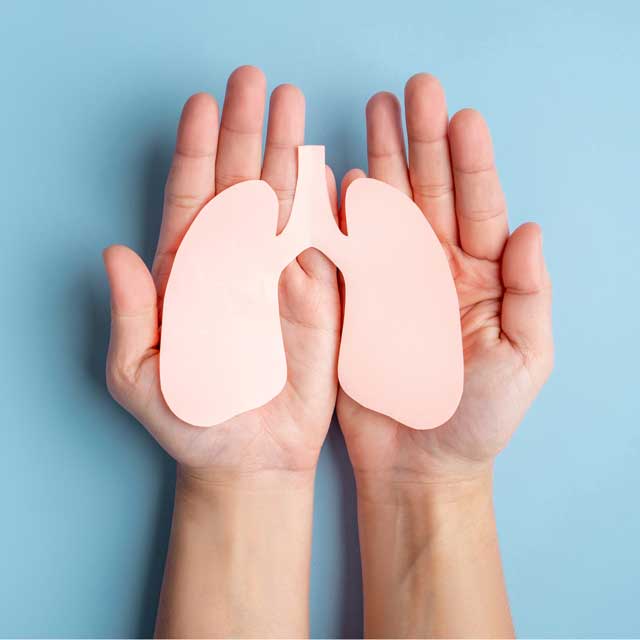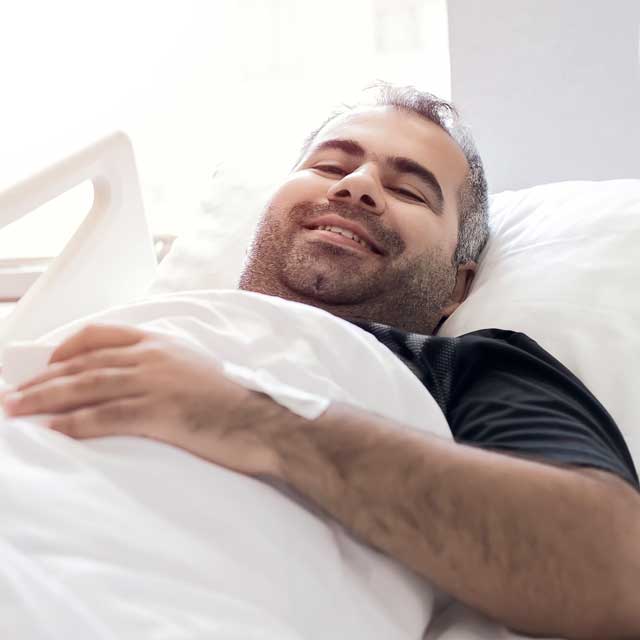Learn more about recovering in the months – and years! – after a lung transplant.
If you’re a candidate for a lung transplant because of advanced lung disease that’s impacting your quality of life, you may wonder what recovery after this surgery is like.
“The reason we do lung transplant is because we think that we can improve survival for a lot of our patients,” said Dr. David Erasmus, medical director of the Vanderbilt Lung Transplant Program. “For others, we can improve their quality of life. And in some patients, we can improve both.”
Lung transplant outcomes
As a lung transplant candidate, you’re likely dealing with a lung condition that affects your life and prevents you from doing many day-to-day activities and things you enjoy. A lung transplant may change all that.
“Most of the patients we transplant require oxygen therapy, with quite a debilitating lifestyle by the time they get to us,” Erasmus explained. “Patients after lung transplant can expect to be free from that burden, with lung function that would be significantly improved. And they’re able to do things they haven’t been able to do for a long time.”
Overall, the average life expectancy after lung transplant is six to six and a half years. “But there are patients who may live much longer than that,” Erasmus said. “And there are patients who may be quite ill and won’t live that long.”
Erasmus added that if someone gets through their first year after a lung transplant without any significant organ rejection, they are likely to live another seven to nine years, or more. By contrast, many people who need a lung transplant but do not receive one are expected to live only two years or less.
“To see these patients not only off oxygen but thriving several years afterward is a very fulfilling part of what we do,” Erasmus said.
Recovering in the hospital
Your first few days after surgery will be spent in the intensive care unit, Erasmus said. Eventually, you’ll be transferred to a regular hospital room. You’re likely to stay in that regular room for two to three weeks. The time needed for your hospital stay depends on your unique circumstances.
At first, you will have chest tubes to drain fluid, but the surgical team will remove those when the time is right. Shortly after the chest tubes are taken out, you’ll be discharged from the hospital if your recovery is going well. You’ll begin physical rehabilitation while you’re still in the hospital. This will continued after you’re out of the hospital.
The first three months after surgery
In the first three months after your transplant, you’ll need to stay somewhere close to your care team. “It is the time when patients are most vulnerable to infections, rejections and other complications,” Erasmus explained. “So we like our patients to stay close by.”
During this time, you’ll undergo frequent bronchoscopies, up to once each week during the first month after your transplant, for your doctors to check for any problems. In a bronchoscopy, the doctor threads a thin flexible tube, which has a light and a camera, through your nose or mouth, down your throat and into your lungs. This lets the doctor check the condition of your lungs and airway.
After that, you’ll get bronchoscopies at regular intervals during the first year after transplant.
You’ll also take medications that suppress your immune system, to prevent organ rejection. That medication regimen may need to be adjusted to your body’s particular needs as time goes on after the procedure, Erasmus said.
Additionally, you’ll start a pulmonary rehab program as an outpatient, meaning without staying in the hospital again. “Many patients will have lost a lot of muscle strength going into transplant because of their limitations from their lung disease,” Erasmus explained. “Their lung function will get better over time, but one needs to work on the entire body to recover properly.”
Recovery after three months and beyond
Once those three months have passed and you’ve successfully completed rehab and your lungs have healed, Erasmus said, you’ll be able to go back to your own home. However, you’ll have follow-up visits with your care team once a month for a year after the transplant surgery.
After that, follow-up visits will happen every three to four months. You will be scheduled for some bronchoscopies as well, to assess the airways and make sure there is no rejection or infection. Once you reach the two-year mark, these bronchoscopies will be scheduled only as needed.
You will continue to be seen in the clinic every three to four months, or more frequently if needed. You will also have to have blood drawn periodically to check levels of medications and to help assess bodily function.
In addition to complying with your physician’s recommendations on follow-up visits and medications, you’ll also need to take certain precautions going forward after lung transplant. Being on immunosuppressive medications can make you more likely to pick up infections, so you’ll need to take precautions to avoid getting sick. Examples include avoiding eating raw or undercooked meat and getting recommended vaccinations. Your transplant team will go over these precautions in detail with you. They may involve changing some of your habits, depending on each person and their medical needs.

Vanderbilt Health has one of the oldest lung transplant programs in the country – and the only one in Tennessee, giving new hope and longer life to patients suffering from end-stage lung disease.




